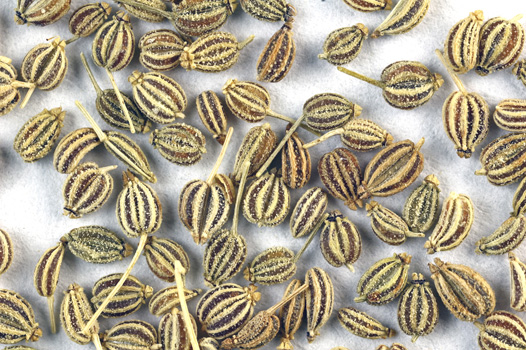Ajwain

Ajwain - aka. Carom (seeds)
Photo: Sanjay Acharya - lic. under CC BY-SA 3.0
Ajwain - Botany And History
Ajwain is a relatively obscure culinary and medicinal spice, commonly employed chiefly in the East (i. e. India, Arabia, and some parts of Asia), but is otherwise uncommon in Western culinary and alternative medicinal applications. Generally believed to have been a native of the Indian continent, ajwain is also commonly found in Arabia and selected parts of Asia, especially along the borders which link Asia to India. From an historical vantage-point, ajwain was highly commonplace in Egypt, where it had been employed first as a medicine, and later on, as a culinary spice for the better part of at least a few thousand years.
It may be assumed that ajwain initially grew wild on Egyptian fertile ground, with use soon spreading throughout much of the Asian and African continent as trade and commerce propagated its usage. In the West, where it is often referred to as 'Bishop's weed' (it must be noted that other plants referred to by this moniker also exists, and the name is not exclusive to Trachyspermum ammi), its usage is somewhat limited chiefly to the cuisine of the respective nations which employ it often, although it can and has been employed as a substitute for spices such as caroway or fenugreek by some more eclectic cooks. Its usage is, however, not chiefly belonging to modern times, as it has been employed and was known as a medicinal plant by the Early Greeks and by the Romans. It has also been employed, albeit less frequently, in Traditional Chinese Medicine. The acquisition of the spice may have been chiefly due to trade, although a strong possibility of transplantation from its native soil (India / Egypt) into areas such as Greece or China may have been common.
The ajwain plant is typically characterised by its very strong resemblance to parsley. It is highly discernable for its small, off-white or ivory-white flowerette clusters which stand-out due chiefly to its pale-pink or carnation stamens. The whole of the plant is thin, relatively hardy, and characterised as possessing an annual characteristics. The sole useful material that can be culled from the ajwain plant is its seeds - technically pods which grow from the clusters of flowerettes upon reaching maturity. These pods contain minute grey egg-shaped 'seeds' (which are actually fruits of the plant itself) characterised by streaks of yellow which occur in a patterned interval, making it somewhat redolent of the abdomen of some species of wasps or bees, with the exception being that the streaks run vertically. [1] Ajwain seeds are sold in whole form (commonly dried, although fresh seeds are also employed for culinary purposes), although they may be ground and mixed with other spices, or otherwise employed in its ground state.
Ajwain - Herbal Uses
Ajwain is a choice culinary herb in many parts of Asia, although its most prolific usage comes from India, and, prior to that, Egypt. Its influence and importance to Egyptian cuisine is nevertheless still apparent in areas such as Ethiopia, Sudan, Iraq, Pakistan, and the greater part of the Levant, where it too is employed as a popular culinary spice usually by itself or otherwise mixed with other spices (a practice also common in India, where it may be employed as a substitute for cardamom or fenugreek in some masala mixtures). It is characterised by its fragrant, spicy, yet somewhat mellow aroma redolent of thyme when fresh, and somewhat similar to caraway when in its dried state.
Ajwain is usually employed for fried or sauteed dishes, although it may be a secondary ingredient for some types of curries or stews. When employed for culinary purposes in the western sense, it can be employed as a rub for meats, although its slightly strong flavour usually renders it more apt for meats than seafood, although when employed fresh it makes for an excellent complimentary spice for seafood-based dishes. In its dried state, it works best when employed for gamey meats, although more traditional systems of cooking employ it to give a little kick to vegetable-based dishes. When employed for cooking, it is usually used only sparingly, and is sautÈed in oil along with other spices prior to the addition of other integral ingredients in a process referred to as tadka. Ajwain can be further employed as a flavouring and preservative agent for pickles, chutneys, jams, and other preserves, or as a complimentary additive to sweetmeats and some types of traditional desserts - a practice quite common in the Arabian and Indian cultures which frequent its usage. [2]
The medicinal usage of ajwain is strongly connected to its culinary applications, as the consumption of foodstuffs containing ajwain have moderate medicinal and therapeutic benefits. It is believed to readily relieve stomach complaints and other gastric problems, which is why it is typically mixed with heavy foodstuffs to allow for ease in digestion after. When used solely as medicine however, ajwain seeds are usually decocted into a mild beverage and drunk as a before and after-meal drink to help facilitate digestion, improve nutrient absorption, whet the appetite, and prevent the occurrence of bloating, stomachaches, and indigestion. [3] When consumed in moderate amounts regularly, ajwain seeds help to improve the overall circulation of the body, while it tonifies the spleen, the liver, and the heart making it can excellent allaround tonic. Because ajwain helps to improve circulation, it has even been employed in both Traditional Chinese Medicine and in Ayurveda as an aphrodisiac. In India, ajwain seeds are usually decocted with fresh cow's or goat's milk and the resulting beverage given to infants and juveniles as a nutritive drink. It has a been employed as a traditional remedy for stomach-aches, colic, and even for mild fevers. [4] Moderate brews of the milk-and-ajwain mixture may be given to pregnant and lactating women to help in the proper absorption of nutrients from the consumed food, although only very minute amounts should be imbibed as over-consumption of this spice may result in complications such as uterine contractions. [5]
Stronger decoctions of the spice may be employed as a remedy for coughs, cold, flu, and mild to moderate fevers. When mixed with spices such as ginger root and cinnamon bark, it makes for an excellent warming beverage for the treatment of chills, and to prevent the progression of the onset of pneumonia or bronchitis. For a more nutritive beverage, perfect for convalescent individuals who are suffering from wasting diseases such as tuberculosis, create a mixture of lemongrass, milk, fresh organic eggs, ajwain seeds, cinnamon bark, ginseng root, cloves, and fresh cow or goat's milk heated in a clay or stainless-steel pot sweetened with honey, molasses, or jaggery if desired.
To make a cough and cold syrup, one can alternately grind ajwain seeds into a powder and mix it with honey or jaggery. For a stronger kick, mix dried and powdered ginger root, dried and powdered garlic powder, and dried and powdered cinnamon bark. This syrup may even be made into handy candies for sore or strep throats simply by pouring the mixture into ice-trays and allowing the substance to set into a solid mass in the freezer. These can then be wrapped in waxed paper or plastic and taken whenever needed to help relieve sore throat, chest congestion, and even nasal congestion brought about by allergies.
Ajwain is also a famed antiseptic and antimicrobial spice due to the presence of the active chemical compound thymol. Due to the presence of said compound, very strong decoctions of ajwain can be employed disinfection of mild to moderate dermal injuries, or otherwise employed as an antibacterial agent an used as a mouthwash or as a sterilisation and medicated rinse for bandages and the like. Ajwain may be employed in lieu of synthetic antiseptics and astringents for the treatment of a wide assortment of dermal problems, usually of the bacterial or fungal variety. When employed as a topical hair rinse, it can even prove to be beneficial for the treatment of psoriasis, eczema, dandruff, and, in more potent decoctions, even lice and fleas. [6]
In Ayurvedic medicine, ajwain has long been employed as a remedy for toothaches and earaches. Usually decocted until a very potent and pungent liquor is obtained, or otherwise allowed to macerate in oil (usually with the help of heat via a double-boiler for faster and more potent extraction) the substance can then be gently funneled into the ear or otherwise applied into the affected area to provide near-instantaneous relief from the associated discomfort. The latter remedy may even be employed as a salve or ointment for rheumatism and arthritis, as ajwain possesses significantly potent analgesic and anti- inflammatory benefits. [7] The same oil can employed as a hair-oil to help combat dandruff, fight parasitic infection, and allay the symptoms of psoriasis. It may even be applied topically as a disinfectant oil to hasten the healing of wounds and prevent infection, or otherwise used as a shaving oil or aftershave facial oil to tone the skin, close the pores, disinfect the raw area, and allow for a smoother, 'fresher' shave.

Macerating crushed or bruised ajwain seeds in apple cider vinegar or white vinegar also makes for an excellent facial astringent, hair rinse, wound disinfectant and styptic. When employed for pain-relief, fresh or dried ajwain seeds may even be crushed or pounded into a paste with the addition of a little oil, and the resulting poultice applied to the affected area to provide instant relief. This also works efficiently for the relief of bronchitis, and for the alleviation of the symptoms of asthma. When applied as a poultice to the forehead or the temples, it helps to relieve the symptoms of recurring headaches. The poultice may even be applied to open minor and moderate wounds in order to facilitate disinfection and hasten healing, or otherwise employed as a facial mask to help relieve the severity of acne, reduce the excess production of sebum, and help tone the skin. When combined with comfrey and red ginger root, the poultice may be applied to mending fractures in order to hasten healing.
Ajwain - Esoteric Uses
Because ajwain is a relatively obscure spice in the Western sphere of the world, it plays very little role in magickal correspondence and in Western sorcery. It can and may be employed as an alternative for thyme, coriander, or caraway. Employing Western practices of magickal correspondence, ajwain may be employed as either a talismanic spice (when encased in a medicine pouch or juju bag to help dispel illnesses or misfortune, or otherwise brewed into a potion or burnt as an incense to help encourage harmony and drive away evil or malignant forces. It may also be employed as a magickal herb that improves and increases the flow of Power (i. e. Spirit Power, or Puha in shamanism), and is therefore useful in healing and enervating or empowering spells.
Ajwain - Contraindications And Safety Notes
While ajwain is regarded as relatively safe for daily use when taken in minute to moderate dosages, care should be taken when employing it for long-term consumption as it may cause photosensitivity in some individuals, especially when taken regularly for prolonged periods of time. Extreme care should also be taken by individuals who are under medications for liver or kidney trouble, as well for general pain-relief, as the active compounds found in the spice may interact with the synthetic drugs, eliciting detrimental after-effects. As a general rule, pregnant and lactating women are advised to avoid the consumption of ajwain, although from a traditional vantage point, minute amounts of the spice is generally considered safe.
Ajwain - Other Names, Past and Present
Chinese: zhuijao de za cao
Korean: jugyoui jabcho
Sanskrit: dipyaka / yamanika
Hindi: ajvini / ajwanjavane / adarjawan
Tamil: omam / omum
Arabic: ajwain / ajowan
French: ajowan / ammi eleve / carum / grand ammi
Italian: ajowan / ameo bastardo
Spanish: ajave (not to be confused with the plant agave (genus Agave) / ajowan / espuma del mar
English: Bishop's weed / ajwain (adapted) / carom (adapted) / Ethiopian cumin / ajowan caraway
Latin (esoteric): carom / ameo
Latin (scientific nomenclature): Trachyspermum ammi
References:
[1] https://en.wikipedia.org/wiki/Trachyspermum_ammi
[2] https://indianfood.about.com/od/thebasics/p/ajwain.htm
[3] https://www.satvikshop.com/blog/herbs-knowledge-base/ajwain
[4] https://www.nutrition-and-you.com/ajwain.html
[5] https://health.india.com/diseases-conditions/top-10-health-benefits-of-ajwain/
[6] https://www.geocities.ws/ayurveda_adviser/ayurveda_ajwain.html
Main article researched and created by Alexander Leonhardt.
© herbshealthhappiness.com


1. Famous Chef Sheds 60lbs Researching New Paleo Recipes: Get The Cookbook FREE Here
2. #1 muscle that eliminates joint and back pain, anxiety and looking fat
3. Drink THIS first thing in the morning (3 major benefits)
4. [PROOF] Reverse Diabetes with a "Pancreas Jumpstart"
5. Why Some People LOOK Fat that Aren't
6. Amazing Secret Techniques To Protect Your Home From Thieves, Looters And Thugs
7. The #1 WORST food that CAUSES Faster Aging (beware -- Are you eating this?)
If you enjoyed this page:





























